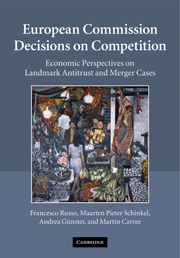 European Commission Decisions on Competition
European Commission Decisions on Competition Book contents
- Frontmatter
- Contents
- List of figures
- List of tables
- List of abbreviations
- Table of legislation
- Table of equivalences
- Acknowledgments
- 1 Introduction
- 2 Horizontal restrictions
- 3 Abuse of dominance
- 4 Licensing
- 5 Vertical restrictions
- 6 Joint ventures and alliances
- 7 Restrictions to competition by Member States
- 8 Mergers and acquisitions
- Annex I Decisions related to procedural issues
- Annex II Table of landmark decisions described in the book
- Annex III Table of mergers blocked by the European Commission in chronological order
- Annex IV Table of landmark merger decisions described in the book in alphabetical order
- Annex V Table of antitrust decisions in alphabetical order
- Bibliography
- Index
- References
1 - Introduction
Published online by Cambridge University Press: 04 August 2010
- Frontmatter
- Contents
- List of figures
- List of tables
- List of abbreviations
- Table of legislation
- Table of equivalences
- Acknowledgments
- 1 Introduction
- 2 Horizontal restrictions
- 3 Abuse of dominance
- 4 Licensing
- 5 Vertical restrictions
- 6 Joint ventures and alliances
- 7 Restrictions to competition by Member States
- 8 Mergers and acquisitions
- Annex I Decisions related to procedural issues
- Annex II Table of landmark decisions described in the book
- Annex III Table of mergers blocked by the European Commission in chronological order
- Annex IV Table of landmark merger decisions described in the book in alphabetical order
- Annex V Table of antitrust decisions in alphabetical order
- Bibliography
- Index
- References
Summary
An active protection of competition in and across Member States was recognized in the Treaty of Rome of 1957 as an important fundament for a unified European Economic Community (EEC). The importance of economic analysis in European competition policy has increased over the history of its enforcement. European competition law enforcement is an active area where law and economics meet. This book presents a systematic analysis and classification of all formal decisions adopted by the European Commission in antitrust cases between 1962, when European competition policy became effective, due to the adoption of Regulation 17, and 2009. Included are all Commission decisions pursuant to Articles 101 (agreements and concerted practices), 102 (abuse of dominance), and 106 (special or exclusive rights granted to undertakings by Member States) of the Treaty on the Functioning of the European Union (FEU Treaty). The book also contains a chapter on mergers and acquisitions (M&As) landmark cases dealt with by the European Commission. Finally, the book lists the decisions the Commission adopted in case of lack of due cooperation by the undertakings involved in antitrust proceedings.
The leading principle in classifying and presenting the decisions in this book is the economic issue central to a case. We have drawn up an extensive list of mainstream economic theories of anticompetitive behavior, and describe the first and landmark European Commission decision in which that type of behavior was at the core of the analysis. This book brings together “economic landmark cases.”
- Type
- Chapter
- Information
- European Commission Decisions on CompetitionEconomic Perspectives on Landmark Antitrust and Merger Cases, pp. 1 - 25Publisher: Cambridge University PressPrint publication year: 2010


